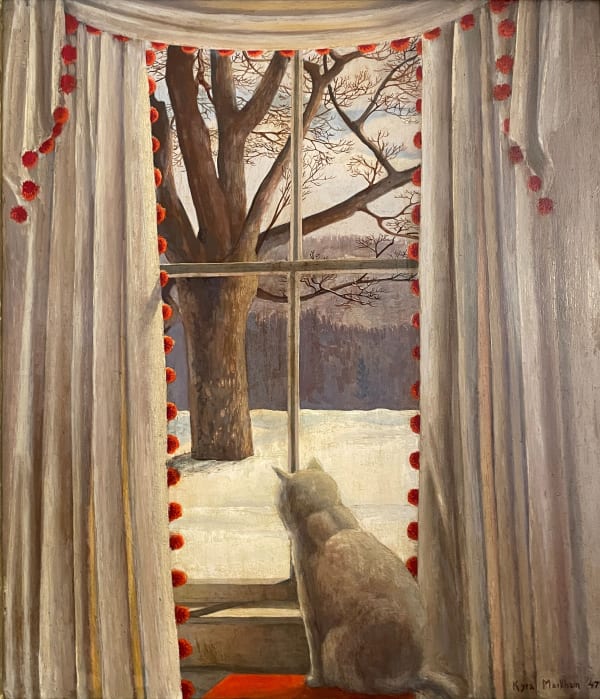Works
Biography
A painter in watercolor and oil, Alice Schille was a prolific artist using modernist styles of Post-Impressionism, Pointillism and Fauvism. Her subjects included portraits of women and children, landscapes with and without figures, a series of scenes of New York City. New Mexico, and Gloucester, Massachusetts. Her paintings also reflected her widespread international travels in Europe, North Africa, Russia, the Middle East, Mexico, and Guatemala.
Although personally very shy, Schille possessed unusual courage and strength of will, which was reflected in both her independent lifestyle and in her work, as she continually worked to master new modes of painting throughout her career. A German critic once referred to Schille as "this daredevil disciple of art who is interested in anything and afraid of nothing."
Alice Schille was born in Columbus, Ohio to a family supported by her father's success in manufacturing. She was raised in Columbus, and by the time she was age six, she determined to be an artist. She graduated at the top of her class from Central High School in 1887, studied from 1891 to 1893 at the Columbus Art School, and returned there as a teacher from 1902 to 1948.
Going to New York City as a young woman, she enrolled in the Art Students League from 1897 to 1899 and then the New York School of Art with William Merritt Chase and Kenyon Cox. (Some years later, she attended Chase's Shinnecock Summer School on Long Island). From 1903 to 1904, Alice Schille was in Paris at the Academie Colarosi, and also studied privately with Raphael Collin, Rene Prinet, Gustave Courtois and Chase, who was then in Europe.
In 1904, five of her paintings were accepted for exhibition at Societe Nationale des Beaux Arts, and from that time on her work was included regularly in important American annual exhibitions including the Pennsylvania Academy, the Corcoran Gallery, American Watercolor Society, Boston Art Club, and the 1987 inaugural exhibition of the National Museum of Women in the Arts in Washington DC.
Between 1905 and 1914, Alice Schille painted in Europe, and during the summers of 1916 to 1918, worked in New York and Gloucester. In 1919, she was in New Mexico. On this trip, her first to the Southwest, she spent a summer in Taos and Santa Fe and painted scenes including the Taos Pueblo, Canyon Road and local Hispanic and Indian figures. Reportedly the Ranchos de Taos Church was one of her favorite subjects. Many of these New Mexico paintings were hung at annual exhibitions of the Philadelphia Water Color Club.
Between 1920 and 1940, she traveled frequently in the summers, returning to New Mexico and going to Central America and Africa. In 1922, she began her first series of North-African watercolors, and then returned in 1929. Much of her Central American travel was in the 1930s and 1940s.
Schille has received numerous awards and honors from throughout the United States. In 1988, her work was the subject of a traveling museum retrospective exhibition organized by Keny Galleries in association with the Columbus Museum of Art.
Although personally very shy, Schille possessed unusual courage and strength of will, which was reflected in both her independent lifestyle and in her work, as she continually worked to master new modes of painting throughout her career. A German critic once referred to Schille as "this daredevil disciple of art who is interested in anything and afraid of nothing."
Alice Schille was born in Columbus, Ohio to a family supported by her father's success in manufacturing. She was raised in Columbus, and by the time she was age six, she determined to be an artist. She graduated at the top of her class from Central High School in 1887, studied from 1891 to 1893 at the Columbus Art School, and returned there as a teacher from 1902 to 1948.
Going to New York City as a young woman, she enrolled in the Art Students League from 1897 to 1899 and then the New York School of Art with William Merritt Chase and Kenyon Cox. (Some years later, she attended Chase's Shinnecock Summer School on Long Island). From 1903 to 1904, Alice Schille was in Paris at the Academie Colarosi, and also studied privately with Raphael Collin, Rene Prinet, Gustave Courtois and Chase, who was then in Europe.
In 1904, five of her paintings were accepted for exhibition at Societe Nationale des Beaux Arts, and from that time on her work was included regularly in important American annual exhibitions including the Pennsylvania Academy, the Corcoran Gallery, American Watercolor Society, Boston Art Club, and the 1987 inaugural exhibition of the National Museum of Women in the Arts in Washington DC.
Between 1905 and 1914, Alice Schille painted in Europe, and during the summers of 1916 to 1918, worked in New York and Gloucester. In 1919, she was in New Mexico. On this trip, her first to the Southwest, she spent a summer in Taos and Santa Fe and painted scenes including the Taos Pueblo, Canyon Road and local Hispanic and Indian figures. Reportedly the Ranchos de Taos Church was one of her favorite subjects. Many of these New Mexico paintings were hung at annual exhibitions of the Philadelphia Water Color Club.
Between 1920 and 1940, she traveled frequently in the summers, returning to New Mexico and going to Central America and Africa. In 1922, she began her first series of North-African watercolors, and then returned in 1929. Much of her Central American travel was in the 1930s and 1940s.
Schille has received numerous awards and honors from throughout the United States. In 1988, her work was the subject of a traveling museum retrospective exhibition organized by Keny Galleries in association with the Columbus Museum of Art.
Press
Exhibitions
Enquire



